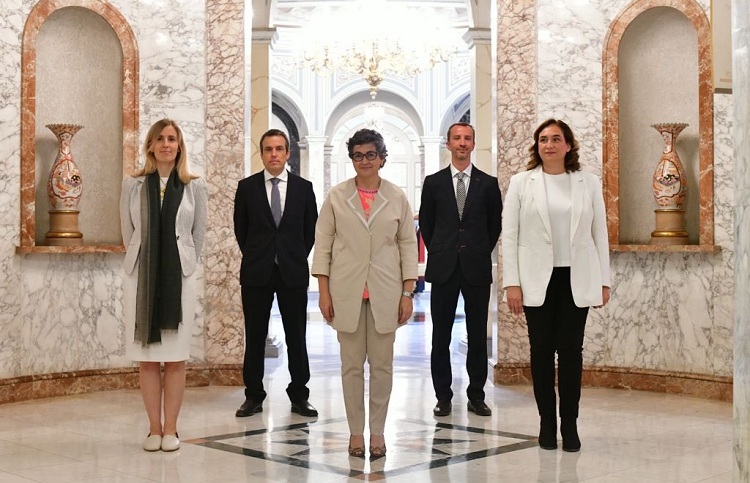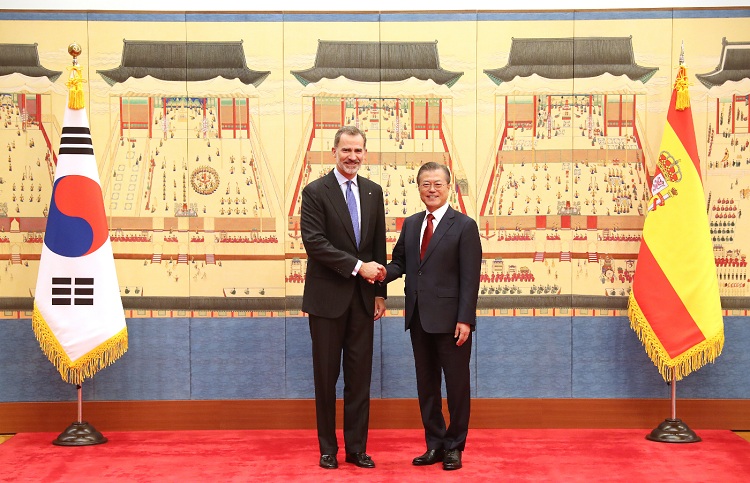Eduardo González
Casa Asia commemorated yesterday its twentieth anniversary at the Royal Palace of Pedralbes in Barcelona, the same building that, at the proposal of the City Council of Barcelona and with the more than foreseeable support of the Government and the Generalitat, will house the definitive headquarters of this institution of Spanish public diplomacy.
“We hope to return soon to inaugurate the new headquarters”, declared the Minister of Foreign Affairs, Arancha González Laya, during the commemorative act, in which she highlighted the role of Casa Asia “to strengthen ties and join efforts of all the administrations in defense of foreign relations”, and warned of the need to relaunch economic relations between Spain and Asia because, “economically, we are far below the potential and the average of commercial integration of the European Union with the Asian continent”.
The transfer of the headquarters of the institution to the Pedralbes Palace, which also currently houses the secretariat of the Union for the Mediterranean (UfM), was recently proposed by the City Council of Barcelona and, in principle, has the support of the other two administrations involved in the management of Casa Asia, the Ministry of Foreign Affairs and the Generalitat of Catalonia.
Precisely, the mayor of Barcelona, Ada Colau, declared in the same event yesterday that the twentieth anniversary of the institution is “an opportunity to reiterate the commitment of Barcelona with Casa Asia and to find a solution to its location”. “We are committed to Casa Asia and, as a sign of that commitment, we have made a proposal that, of course, will be submitted for study by the rest of the members of the consortium,” she continued. “I am sure that we will find the most appropriate headquarters and at the height of such an important element for our diplomacy,” added Colau, who said that Casa Asia “is a bridge that unites us with the most dynamic area of the world.”
For her part, the conseller (regional minister) of Foreign Action of the Generalitat, Victòria Alsina, pledged that the next twenty years of relations between Catalonia and Asia will be “more prolific” through Casa Asia than the previous twenty years and assured, in her first public speech since her appointment, that the Asia-Pacific region is a strategic priority in Catalonia, which in recent years has “exponentially increased its relations with the countries of this area”.
The director of Casa Asia, Javier Parrondo, urged the three administrations involved to “provide resources” to the institution and to “maintain the spirit that led to the creation” of the consortium, based on “cooperation” between public administrations, while acknowledging the “effort” made by Casa Asia’s workers, “not always in the best conditions”. He also presented the commemorative events of the twentieth anniversary, which will last until November 2022 in Barcelona and Madrid and in online format.
The commemorative event was also attended by the delegate councilor of Internationalization and Cooperation of the Madrid City Council, Santiago Saura (who conveyed “the support and commitment” of the capital with Casa Asia, “the reference institution between Spain and Asia in the economic and cultural field”); the ambassador of Afghanistan in Spain, Humayoon Rasaw, representing the group of Ambassadors of Asia and Pacific in Madrid; and the former Minister of Foreign Affairs Josep Piqué and the former mayor of Barcelona Joan Clos, signatories of the agreement to establish Casa Asia in 2001.
The three headquarters and the financial ‘disconnection’
Casa Asia was born in 2001 after a collaboration agreement between the Ministry of Foreign Affairs, the Generalitat and the City Council of Barcelona, which make up the Governing Council. Since its foundation, the institution has had three headquarters in Barcelona (apart from a delegation in Madrid). Initially it was housed in the Palacio del Baró de Quadras, but the high rent demanded by the real estate company Alting forced it to move to the historic site of the Hospital de Sant Pau i la Santa Creu, from which it would be evicted years later for non-payment of rent. The current headquarters has been located, since November 2018, in the building of the National Commission for Markets and Competition (CNMC) in Barcelona.
This pilgrimage from one headquarters to another is coupled with financial problems with strongly political components. The collaboration agreement establishes that the Ministry must pay 60% of the ordinary and program expenses of the consortium and the City Council and the Generalitat share equally the remaining 40%. However, the Generalitat has considerably reduced its contributions to Casa Asia since 2013, as part of its policy of expanding its presence abroad and ‘disconnecting’ from the Ministry of Foreign Affairs. The reduction reached almost 80% in 2015. At the end of 2016, the Catalan Government of Artur Mas committed to pay 340,000 euros, which finally remained at 90,000, while the following Executive of Carles Puigdemont limited itself to claiming that the 2016 budgets did not include any item for Casa Asia. In the 2018 and 2019 fiscal years, the contribution of the Generalitat was 180,000 euros.
As a result of all this, the report of the annual accounts of Casa Asia in 2018 revealed a “delicate patrimonial situation” that threatened its continuity because of the decrease in the contributions of the Generalitat and the City Council. In contrast, the 2019 report (the last one published to date) shows a positive balance of 40 million euros thanks to extraordinary amounts injected by the Ministry of Foreign Affairs.







